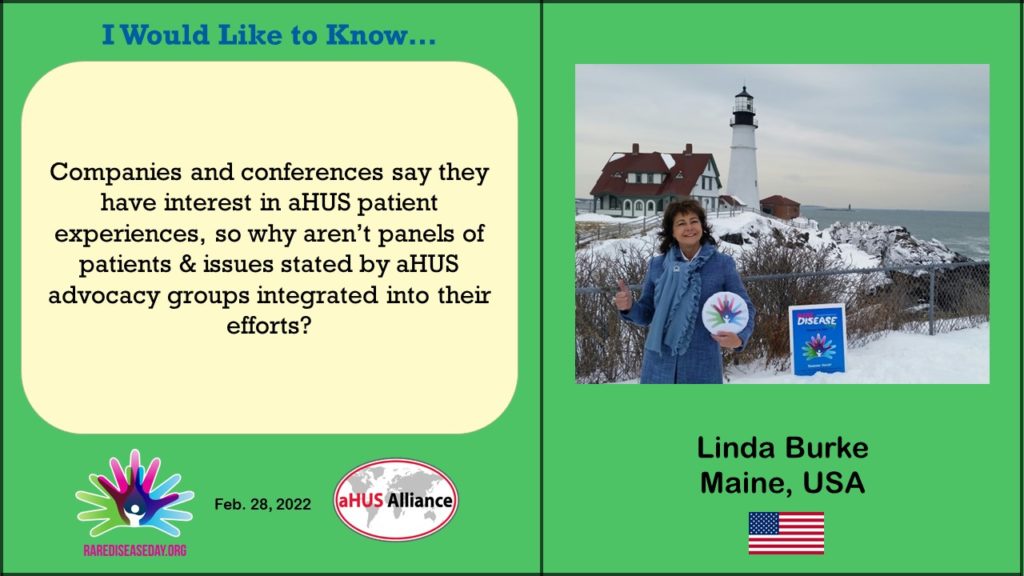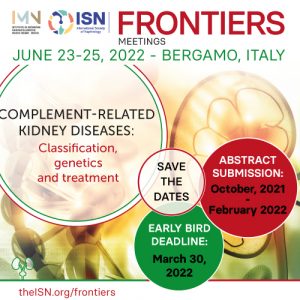A final question in the RDD2022 video series on how to integrate a patient voice of experience into aHUS Pharma and aHUS conferences.
Patient centricity is now a byword for relationships between Pharma and patients, patients’ families and friends along with patient organisations. It is something easier to say than do.
Setting aside the layers of regulations, whether voluntary or compulsory, that constrain open dialogue for ethical and fiduciary reasons, much of which varies from country to country, integration of patient expressed needs require an agreed infrastructure. An enabling platform and channels that are consistent and sustainable and safe for patients to participate.

Linda is a global advocate of standing for as long, it seems, as there has been patient advocacy for aHUS. So if from her experience, mainly of Alexion from very early days, but also of a multitude of other Pharma ,who have looked to have been interested in aHUS therapeutics over the past decade, it is clearly something that is yet to be achieved.
Pharma are multi dollar businesses. Even Alexion, which is now just a division of AstraZeneca, has multiple therapies in progress. Their focus is across multiple diseases . aHUS is becoming a smaller and less important element. It was always secondary to PNH.
aHUS patient organisations are not in the scale of other organisation competing for Pharma’s attention. Neither do they employ the ”professional advocates” which have become a growth industry in recent years. aHUS advocacy has not grown, attempts to do things better together have had limited effect. aHUS Awareness Day , aHUS social media and a global website platform being the exception. It has been through these that patients insights have been garnered for all to see.
And such insights are evidenced based. Not just off the top of the head , nor generically from employed professionals, but by patients and their advocates together. We seek to understand through our own research and scanning the horizons for new technologies, developments and trends. All of which allows us to speak with some authority on what matters to aHUS patients.
No need to reinvent the wheel every time but something to put before Pharma. Even as its employees turnover, time and time again, as they switch between different Pharma. Integration of efforts are eroded by this churn and progress is slowed.
Many opportunities have been lost for patient input where and when it mattered. The talk of collaboration is not followed up by the walk. And now other Pharma are on the scene. Opening other dialogue channels.
So what can be done differently? It needs something to be structured, authoritative, professional, and sustainable? It must not be allowed to burn out and deplete the people who do it and who are only volunteers after all.
And at the end of the day where would the people needed to do it come forward from,. Those with a capability and a willingness to volunteer a couple of hours a week of their time. Possess the expertise , the energy and motivation to help others.Who would have the freedom post COVID to travel internationally to meet with Pharma and others.
To create something that could be representative ,respected, valued and appreciated? Something that those keen to be aHUS advocates would want to be a part of.
It is a big ask.
aHUS alliance Global action has been grappling with this since before COVID with the realisation that the 2020s is going to be decade of opportunity for aHUS patients everywhere. Thought and feelings about what this may entail were expressed in a blog about patient centricity in 2019. Another blog for a call for something stronger to emerge was again made at the start of 2022.
What other disease organisation networks are opting for is disease Community Advisory Board. ( Click here to read about the Board created by the Deuchenne Muscular Dystrophy community)
Like Deuchenne advocates found it cannot be done alone but together in a partnership of global and continental international activists.
A Global aHUS Community Advisory Board would be need to be formal and open to those affected by aHUS who believe and wish they could contribute to the dialogue needed with Pharma and Researchers.
A dialogue to influence patient centric solutions which matter to aHUS people wherever they live.
This is why activities like the Rare Disease Day video are important. Patients expressing what is most important and of most concern to them. It goes to help building an agenda for dialogue and action.
As for conferences, unless run by patient organisation themselves, it is down to being invited. To be invited it is necessary to be known. To be known as knowledgeable experts. Experts from personal experience or from wider awareness of aHUS patients. An ability to provide valuable evidence. To add value so that patients are seen not just as suppliers of blood and tissue sample providers. patients included.
It takes time to develop such relationships.

But the upcoming international conference in June about aHUS and MPGN in Bergamo has integrated patients into its programme. The conference has designed a part of the agenda for patients to have a say and create a dialogue between clinicians/ researchers and those living with the disease.
More information about the Bergamo symposium can be found in this blog article HERE.
So the final question has been answered. Just one more article to follow on what will come from the video project this year.
Article No. 515

